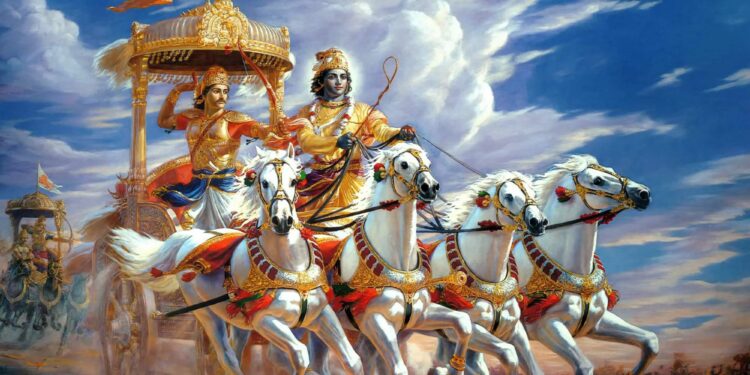TEXT 3
ārurukṣor muner yogaṁ
karma kāraṇam ucyate
yogārūḍhasya tasyaiva
śamaḥ kāraṇam ucyate
SYNONYMS
ārurukṣoḥ—who has just begun yoga; muneḥ—of the sage; yogam—the eightfold yoga system; karma—work; kāraṇam—the means; ucyate—is said to be; yoga—eightfold yoga; ārūḍhasya—of one who has attained; tasya—his; eva—certainly; śamaḥ—cessation of all material activities; kāraṇam—the means; ucyate—is said to be.
TRANSLATION
For one who is a neophyte in the eightfold yoga system, work is said to be the means; and for one who is already elevated in yoga, cessation of all material activities is said to be the means.
PURPORT
The process of linking oneself with the Supreme is called yoga. It may be compared to a ladder for attaining the topmost spiritual realization. This ladder begins from the lowest material condition of the living entity and rises up to perfect self-realization in pure spiritual life. According to various elevations, different parts of the ladder are known by different names. But all in all, the complete ladder is called yoga and may be divided into three parts, namely jñāna-yoga, dhyāna-yoga and bhakti-yoga. The beginning of the ladder is called the yogārurukṣu stage, and the highest rung is called yogārūḍha.
Concerning the eightfold yoga system, attempts in the beginning to enter into meditation through regulative principles of life and practice of different sitting postures (which are more or less bodily exercises) are considered fruitive material activities. All such activities lead to achieving perfect mental equilibrium to control the senses. When one is accomplished in the practice of meditation, he ceases all disturbing mental activities.
A Kṛṣṇa conscious person, however, is situated from the beginning on the platform of meditation because he always thinks of Kṛṣṇa. And, being constantly engaged in the service of Kṛṣṇa, he is considered to have ceased all material activities.
TEXT 4
yadā hi nendriyārtheṣu
na karmasv anuṣajjate
sarva-saṅkalpa-sannyāsī
yogārūḍhas tadocyate
SYNONYMS
yadā—when; hi—certainly; na—not; indriya-artheṣu—in sense gratification; na—never; karmasu—in fruitive activities; anuṣajjate—one necessarily engages; sarva-saṅkalpa—of all material desires; sannyāsī—renouncer; yoga—ārūḍhaḥ—elevated in yoga; tadā—at that time; ucyate—is said to be.
TRANSLATION
A person is said to be elevated in yoga when, having renounced all material desires, he neither acts for sense gratification nor engages in fruitive activities.
PURPORT
When a person is fully engaged in the transcendental loving service of the Lord, he is pleased in himself, and thus he is no longer engaged in sense gratification or in fruitive activities. Otherwise, one must be engaged in sense gratification, since one cannot live without engagement. Without Kṛṣṇa consciousness, one must be always seeking self-centered or extended selfish activities. But a Kṛṣṇa conscious person can do everything for the satisfaction of Kṛṣṇa and thereby be perfectly detached from sense gratification. One who has no such realization must mechanically try to escape material desires before being elevated to the top rung of the yoga ladder.



















